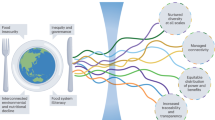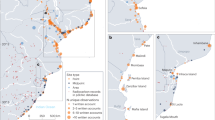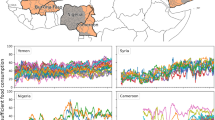Abstract
As food insecurity grows globally, foresight planning for sustainable food systems has become critical. Here we argue that history—through detailed data, case studies and methodologies—can profoundly enhance the robustness of scenario planning. By examining cases in Mozambique, Bangladesh and Holland, we illustrate how historical insights can guide interventions on local, national and transnational scales, helping to avoid unintended consequences and building resilience into future food systems.
This is a preview of subscription content, access via your institution
Access options
Access Nature and 54 other Nature Portfolio journals
Get Nature+, our best-value online-access subscription
$32.99 / 30 days
cancel any time
Subscribe to this journal
Receive 12 digital issues and online access to articles
$119.00 per year
only $9.92 per issue
Buy this article
- Purchase on SpringerLink
- Instant access to the full article PDF.
USD 39.95
Prices may be subject to local taxes which are calculated during checkout

Similar content being viewed by others
References
Schneider, K. R. et al. The state of food systems worldwide in the countdown to 2030. Nat. Food 4, 1090–1110 (2023).
Webb, P. et al. The urgency of food system transformation is now irrefutable. Nat. Food 1, 584–585 (2020).
Fanzo, J. et al. Viewpoint: Rigorous monitoring is necessary to guide food system transformation in the countdown to the 2030 global goals. Food Policy 104, 102163 (2021).
Mora, O. et al. Exploring the future of land use and food security: a new set of global scenarios. PLoS ONE 15, e0235597 (2020).
Harmáčková, Z. V. et al. The role of values in future scenarios: what types of values underpin (un)sustainable and (un)just futures. Sci. Direct 64, 101343 (2023).
Muiderman, K. et al. Is anticipatory government opening up or closing down future possibilities? Findings from diverse contexts in the global south. Glob. Environ. Change 81, 102694 (2023).
Ruggeri Laderchi, C. et al. The Economics of the Food System Transformation (Food System Economics Commission, 2024).
Rockström, J. et al. Planet-proofing the global food system. Nat. Food 1, 3–5 (2020).
Transforming Food Systems for Rural Prosperity (IFAD, 2021).
Rabboh, W. A. et al. An Overview of the Jordanian Food System: Outcomes, Drivers & Activities (Wageningen Centre for Development Innovation, 2023); https://doi.org/10.18174/640975
Schoemaker, P. J. H. How historical analysis can enrich scenario planning. Futures Foresight Sci. 2, e35 (2020).
Vanhaute, E. From famine to food crisis: what history can teach us about local and global subsistence crises. J. Peasant Stud. 38, 47–65 (2011).
Dijkman, J. & Van Leeuwen, B. (eds) An Economic History of Famine Resilience (Routledge, 2020).
Logan, A. L. The Scarcity Slot (Univ. California Press, 2020).
Hannaford, M. J. Deep histories of food systems in eastern Africa and current patterns of food insecurity. Nat. Food 4, 949–960 (2023).
Gengenbach, H. From cradle to chain? Gendered struggles for cassava commercialisation in Mozambique. Can. J. Dev. Stud. 41, 224–242 (2020).
Gengenbach, H., Comé, A. A. & Nhabinde, J. B. Serving ‘the uses of life’: gender, history, and food security in a cassava value chain scheme. Afr. Stud. Rev. 65, 93–117 (2022).
Pingali, P. L. Green Revolution: impacts, limits, and the path ahead. Proc. Natl Acad. Sci. USA 109, 12302–12308 (2012).
Gengenbach, H. ‘Provisions’ and power on an imperial frontier: a gendered history of hunger in 16th century central Mozambique. Int. J. Afr. Hist. Stud. 50, 409–437 (2017).
Alamgir, M. Famine in South Asia: Political Economy Of Mass Starvation Ch. 4 (Oelgeschlager, Gunn & Hain, 1980).
Sen, A. Poverty and Famines: An Essay on Entitlement and Deprivation Ch. 6 (Oxford Univ. Press, 1981).
Elahi, K. Amartya Sen, FAD and the 1974 famine in Bangladesh: a closer look. Bangladesh J. Agric. Econ. 38, 17–33 (2016–2017).
Dowlah, C. The politics and economics of food and famine in Bangladesh in the early 1970s—with special reference to Amartya Sen’s interpretation of the 1974 famine. Int. J. Soc. Welf. 15, 344–356 (2006).
Bangladesh Country Climate and Development Report (World Bank, 2022); https://hdl.handle.net/10986/38181
Crow, B. Warnings of famine in Bangladesh. Econ. Polit. Wkly 19, 1754–1758 (1984).
Clay, E. The 1974 and 1984 floods in Bangladesh: from famine to food crisis management. Food Policy 10, 202–206 (1985).
Raihan, S. et al. Effects of Inflation on the Livelihoods of Poor Households in Bangladesh: Findings from Sanem’s Nationwide Household Survey 2023 (SANEM, 2023); https://sanemnet.org/wp-content/uploads/2023/11/SANEM-Houeshold-Survey-Report-2023.pdf
Van Bavel, B. J. P. & Van Zanden, J. L. The jump-start of the Holland economy during the late-Medieval crisis, c. 1350–c. 1500. Econ. Hist. Rev. 57, 503–532 (2004).
Dijkman, J. Shaping Medieval Markets: The Organisation of Commodity Markets in Holland, c. 1200–c. 1450 Ch. 3 (Brill, 2011); https://doi.org/10.1163/ej.9789004201484.i-447
De Vries, J. The Price of Bread: Regulating the Market in the Dutch Republic Ch. 10 (Cambridge Univ. Press, 2019).
Curtis, D. R. & Dijkman, J. The escape from famine in the northern Netherlands: a reconsideration using the 1690s harvest failures and a broader northwest European perspective. Seventeenth Century 34, 229–258 (2019).
Parker, G. Global Crisis: War, Climate Change and Catastrophe in the Seventeenth Century Abridged edn (Yale Univ. Press, 2017).
Degroot, D. The Frigid Golden Age: Climate Change, the Little Ice Age, and the Dutch Republic, 1560–1720 Ch. 3 (Cambridge Univ. Press, 2018).
Sundberg, A. Natural Disaster at the Closing of the Dutch Golden Age: Floods, Worms, and Cattle Plague Ch. 3 & 4 (Cambridge Univ. Press, 2022).
Climate Change and Agriculture Scenarios for Zambia: Socio-economic Scenarios (FAO, 2013); https://openknowledge.fao.org/server/api/core/bitstreams/6fe64668-2b13-4748-a676-7038e6b25735/content
Nkhoma, B. G. ‘The native is the producer of the future’: improving peasants’ food production in southern Malawi, 1859–1939. J. South. Afr. Stud. 46, 283–299 (2020).
Nkhoma, B. The “malnutrition syndrome”: African diets, nutrition science, and colonial research in southern Africa. Afr. Hist. Rev. 54, 1–12 (2023).
De Leeuw, S. Alice through the looking glass: emotion, personal connection, and reading colonial archives along the grain. J. Hist. Geogr. 38, 273–281 (2012).
Stoler, A. L. Along the Archival Grain: Thinking Through Colonial Ontologies (Princeton Univ. Press, 2008).
Adamson, G. C. Private diaries as information sources in climate research. Wiley Interdiscip. Rev. Clim. Change 6, 599–611 (2015).
Endfield, G. H. & Nash, D. J. Missionaries and morals: climatic discourse in nineteenth-century central southern Africa. Ann. Assoc. Am. Geogr. 92, 727–742 (2002).
Gengenbach, H. et al. Limits of the New Green Revolution for Africa: reconceptualising gendered agricultural value chains. Geogr. J. 184, 208–214 (2018).
Mandala, E. The End of Chidyerano: A History of Food and Everyday Life in Malawi, 1860–2004 (Heinemann, 2008).
Henige, D. in Writing African History (eds Achi, B. et al.) 169–190 (Boydell & Brewer, 2005).
Liesegang, G. The Arquivo Histórico de Moçambique and historical research in Maputo. Hist. Afr. 27, 471–477 (2000).
Degroot, D. et al. Towards a rigorous understanding of societal responses to climate change. Nature 591, 539–550 (2021).
Van Bavel, B. J. P. et al. Climate and society in long‐term perspective: opportunities and pitfalls in the use of historical datasets. Wiley Interdiscip. Rev. Clim. Change 10, e611 (2019).
Burgdorf, A. M. et al. DOCU-CLIM: a global documentary climate dataset for climate reconstructions. Sci. Data 10, 402 (2023).
Veale, L. et al. Dealing with the deluge of historical weather data: the example of the TEMPEST database. Geo 4, e00039 (2017).
MacKay, R. B. & McKiernan, P. The role of hindsight in foresight: refining strategic reasoning. Futures 36, 161–179 (2004).
Staley, D. J. A history of the future. Hist. Theory 41, 72–89 (2002).
Inayatullah, S. Foresight in challenging environments. J. Futures Stud. 22, 15–24 (2018).
The Future of Food and Agriculture: Drivers and Triggers for Transformation (FAO, 2022); https://doi.org/10.4060/cc0959en
Hubeau, M. et al. New agri-food systems sustainability approach to identify shared transformation pathways towards sustainability. Ecol. Econ. 131, 52–63 (2017).
Acknowledgements
We gratefully acknowledge the support received from BrIAS—Brussels Institute for Advanced Studies (Vrije Universiteit Brussel/Université Libre de Bruxelles) and the Food and Agriculture Organization of the United Nations Regional Office for Asia and the Pacific. N.d.M. was supported by the Research Council of the Vrije Universiteit Brussel (grant IRP21).
Author information
Authors and Affiliations
Contributions
N.d.M., J.D., M.H., L.L., R.P.N.-M. and A.M.N.U. conceptualized the Perspective, developed the framework and selected the case studies. N.d.M., J.D. and M.H. drafted the initial paper, with substantial contributions from L.L. The paper was revised collaboratively by N.d.M., J.D., M.H. and L.L. J.D. managed and finalized the reference list. L.L., R.P.N.-M. and A.M.N.U. provided critical insights and suggestions, particularly on the Bangladesh case and the foresight planning process. R.P.N.-M. designed the graph. N.d.M. brought the group together, coordinated the writing process, and completed the final edits and the graph.
Corresponding author
Ethics declarations
Competing interests
The authors declare no competing interests.
Peer review
Peer review information
Nature Sustainability thanks Eric Vanhaute and Kate Schneider for their contribution to the peer review of this work.
Additional information
Publisher’s note Springer Nature remains neutral with regard to jurisdictional claims in published maps and institutional affiliations.
Rights and permissions
Springer Nature or its licensor (e.g. a society or other partner) holds exclusive rights to this article under a publishing agreement with the author(s) or other rightsholder(s); author self-archiving of the accepted manuscript version of this article is solely governed by the terms of such publishing agreement and applicable law.
About this article
Cite this article
de Mûelenaere, N., Dijkman, J., Hannaford, M. et al. The case for history in planning future food systems transformations. Nat Sustain 8, 343–349 (2025). https://doi.org/10.1038/s41893-025-01517-9
Received:
Accepted:
Published:
Version of record:
Issue date:
DOI: https://doi.org/10.1038/s41893-025-01517-9



